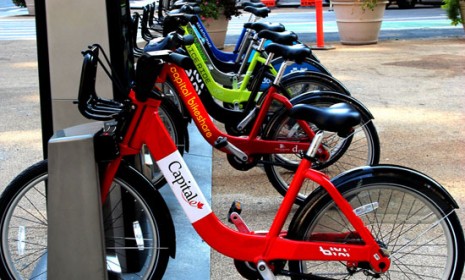The 'sharing economy': The next big business trend
People are using the internet to share all kinds of goods, from cars and apartments to kids' toys and tools. And traditional businesses are taking notice

A free daily email with the biggest news stories of the day – and the best features from TheWeek.com
You are now subscribed
Your newsletter sign-up was successful
The biggest trend in the economy right now isn't tech stocks or oil futures: It's the sharing economy. Otherwise known as collaborative consumption or peer-to-peer marketplaces, the sharing economy is all about getting maximal use out of a product or asset, whether it's renting out your apartment for a few days while you're away or leasing a power tool gathering dust in your garage. With the rise of social networking, the sharing economy is quickly spreading to other economic areas, including finance and childcare. And more than one person says the trend is so seismic that it could be the next Industrial Revolution. Here, a guide to the phenomenon:
How does the sharing economy work?
It's simply a way for people to exchange goods for free. Couchsurfing, for example, enables people to offer up their couches or vacant guest rooms to travelers. But the sharing economy has developed in a way that is firmly "anchored in commerce," says Danielle Sacks at Fast Company. AirBnB, one of the most successful companies on the sharing scene, allows people to rent out their apartments when they're not being used. AirBnB has since expanded so that users can not only monetize their homes, but all kinds of properties, including driveways and yachts.
The Week
Escape your echo chamber. Get the facts behind the news, plus analysis from multiple perspectives.

Sign up for The Week's Free Newsletters
From our morning news briefing to a weekly Good News Newsletter, get the best of The Week delivered directly to your inbox.
From our morning news briefing to a weekly Good News Newsletter, get the best of The Week delivered directly to your inbox.
What are some other big sharing companies?
Zipcar, the popular auto rental company, is a sharing company, in that it allows members to share from a fleet of Zipcar-owned vehicles dispersed throughout their neighborhoods. But newer companies, like WhipCar and RelayRides, allow owners to rent out their own cars. Companies like Lending Club offer peer-to-peer banking, while people can visit sites like NeighborGoods to share appliances and tools. Collaborative work spaces are also gaining traction because they provide start-up companies with real estate "without breaking the bank," says Leah Busque at The Huffington Post.
Why are people so excited about sharing?
A lot of it has to do with how social networking is altering the way we think about products, says Erica Swallow at Mashable. It's getting to the point where "access to goods and skills is more important than ownership of them." And "the benefits are hard to argue — lower costs, less waste, and the creation of global communities with neighborly values," says Sacks.
A free daily email with the biggest news stories of the day – and the best features from TheWeek.com
Can you really trust someone with your property?
In the sharing economy, "one of the biggest pain points is figuring out how to communicate trust between users," says Swallow. Companies are trying create more user accountability, so, for example, if someone violates an owner's trust on AirBnB, it will show up on his record like a user rating on eBay or Amazon. A new company called TrustCloud is trying to develop a "portable reputation system for the internet," says Swallow. By calculating the "reliability, consistency, and responsiveness" of your past behavior on the sharing scene, your profile on TrustCloud would serve as a letter of reference for every site you go to.
Are traditional companies worried?
Yes. Car makers, in particular, are worried that younger customers are less interested in owning cars, especially if they can rent one for a couple of hours from their neighbor. European car companies are rolling out Zipcar-like services, says Sacks, while retailers like Best Buy and Lowe's have taken notice of sharing sites. Economist Umair Haque tells Fast Company, "Certain industries have to rewire themselves, or prepare to sink into the quicksand of the past."
Sources: Fast Company, The Huffington Post, Mashable, O'Reilly Radar
-
 Political cartoons for February 14
Political cartoons for February 14Cartoons Saturday's political cartoons include a Valentine's grift, Hillary on the hook, and more
-
 Tourangelle-style pork with prunes recipe
Tourangelle-style pork with prunes recipeThe Week Recommends This traditional, rustic dish is a French classic
-
 The Epstein files: glimpses of a deeply disturbing world
The Epstein files: glimpses of a deeply disturbing worldIn the Spotlight Trove of released documents paint a picture of depravity and privilege in which men hold the cards, and women are powerless or peripheral